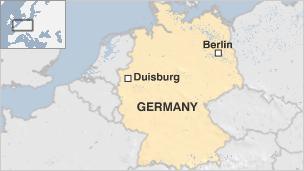Stampede at German Love Parade festival kills 19
- Published
British DJ at the festival: ''Organisers told us to carry on playing."
At least 19 people have been killed in a stampede at the Love Parade dance music festival in the German city of Duisburg, police have said.
Police had been trying to stop people reaching the parade area because of overcrowding.
But the revellers panicked at a tunnel entrance. About 100 people were also injured, dozens seriously.
Police and city officials have launched an investigation into what sparked off the disaster.
German Chancellor Angela Merkel has sent her condolences to the family and friends of the victims.
"Young people came to party. Instead, there was death and injury. I am aghast and saddened by the sorrow and the pain," she said.
Duisburg Mayor Adolf Sauerland defended security measures for the festival and vowed to hold a full inquiry.
"In the run-up to the event, we worked out a solid security plan with the organisers and everyone involved," he said.
"The investigations that have already been launched must uncover the precise course of events."
'Way too full'
More than one million people were believed to have attended the event.
The stampede occurred at about 1700 local time (1500 GMT).
Duisburg police initially reported 10 deaths but the toll later increased to 19.
At least 10 people were resuscitated at the scene.
Reuters news agency quoted police commissioner Juergen Kieskemper as saying the situation had become "very chaotic".
He said police closed the parade area due to overcrowding. Those trying to get in were told via loudhailer to turn around, but panic broke out.
A number of eyewitnesses say police were warned of a huge crowd build-up and some report seeing dozens of people piled up on one another, the BBC's Tristana Moore in Germany says.
Emergency workers reportedly had difficulty reaching those crushed.
One festival-goer, named Marius, told the Bild newspaper: "There was no escape. People were pressed into the wall. I was afraid I'd die."

Another man told local television: "The pressure from behind become so high that... we couldn't do anything any more. People were just pushed together until they fell over."
Another participant, Isabel Schloesser, told Reuters: "There were piles of injured on the ground, some being resuscitated, others dead and covered with sheets. It was way too full in the afternoon, everybody wanted to get in."
A young woman told Die Welt: "Everywhere you looked, there were people with blue faces.
"My boyfriend pulled me out over the bodies, otherwise we would both have died in there. How can I ever forget those faces? The faces of the dead."
Police closed off an elevated motorway bridge to allow helicopters to land and evacuate victims.
City officials were said to have chosen not to evacuate the grounds of the day-long festival immediately, fearing it might spark more panic.
City spokesman Frank Kopatschek said: "The crisis meeting determined not to stop the event because at the moment there are too many people on the grounds."
Many of those attending appeared unaware of what had happened.
German President Christian Wulff issued a statement saying: "It is terrible that such a catastrophe brought death, suffering and pain to a peaceful festival full of happy young people from many countries."
The event attracts music fans from all over the world, with floats from Brazil, Russia, the Netherlands, Spain and Australia among other nations.
The floats had been expected to parade through the city for 10 hours. Many top international DJs also perform.
The event began in Berlin in 1989 as a peace demonstration and developed into a huge open-air music festival.
- Published25 July 2010